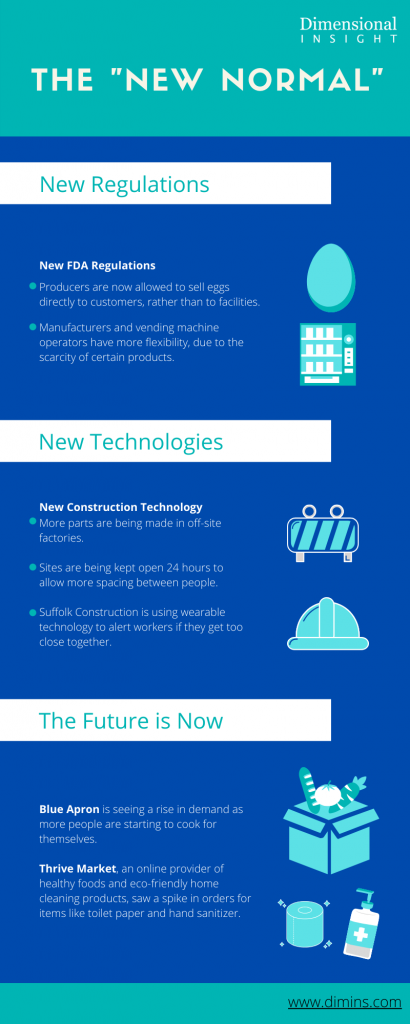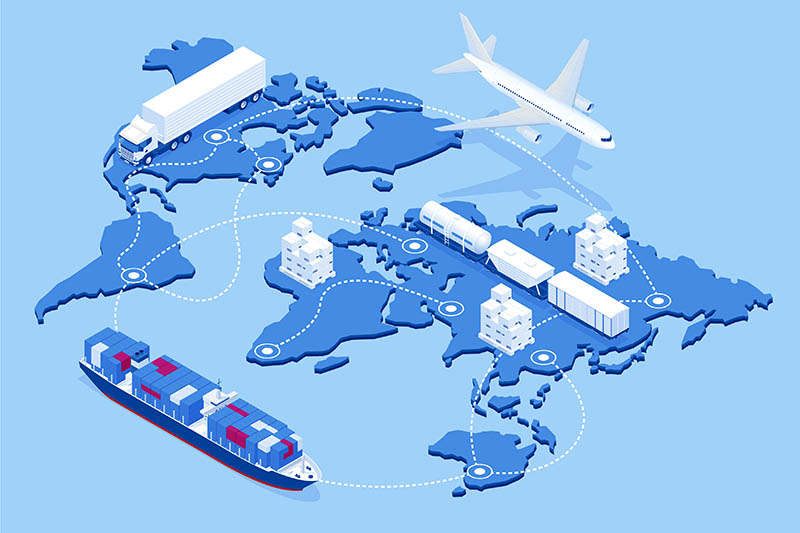Whether or not they are in a part of the country that is slowly opening back up and resuming day-to-day activities, everyone is grappling with the adoption of a “new normal” post COVID-19. That applies to most industries as well.
Though supermarket shelves are better stocked and it appears the supply chain is recovering, it is possible the global supply chain will never look the same. Here are some changes that have already been put in place, as well as more changes that are on the way.
New regulations
Though COVID-19 is still a stark reality in many meat processing facilities, the meat industry is trying to keep its production at a level that will meet demand. The Food and Drug Administration is trying to help by temporarily adjusting regulations to help keep the supply chain intact. In April, the FDA began allowing producers who normally sold eggs to facilities that further processed the eggs for other products to sell their eggs to stores where they could be bought by consumers.
More recently, the FDA provided flexibility to manufacturers and vending machine operators to adjust to the lack of availability of certain products and ingredients. As long as the ingredient change does not significantly impact the product in terms of safety or nutrition, manufacturers will not have to change their ingredients lists. Vending machine operators will not have to list calorie information for products that might be included in a machine instead of regular products that might currently be unavailable.
New technologies
In many places, construction was deemed an essential industry from the beginning of the pandemic. The industry has had to make adjustments, though, in order to ensure worker safety, with a focus on workers’ health as well as social distancing. For some companies, this means a re-examination of their supply chain to look for opportunities to limit workers being too close together. In some cases, parts could be pre-made in a factory before being shipped to a site, and in other cases, it might mean keeping sites open 24 hours to allow for more spacing between people.
Suffolk Construction adopted new technology to use at its construction sites. They are using scanners that can take temperatures from a distance, which not only ensures workers are healthy on-site, but can also be done more quickly and without the cost of bringing someone in to take temperatures one-by-one. Suffolk is also using a monitor that attaches to workers’ hard hats and sounds an alarm when they get within six feet of a co-worker to help enforce social distancing.
The future is now
With more people preparing food at home during stay-at-home orders and with restaurants closed, meal kit companies like Blue Apron have seen an increase in demand since the beginning of March. They expect to see that trend continue as people are becoming more confident cooking for themselves. Blue Apron will adjust recipes if it is facing a shortage of a certain ingredient, but overall, it was not as affected by supply chain disruptions because it tends to work with smaller suppliers and keep close control over its supply chain.
Thrive Market is an online provider of healthy foods and eco-friendly home cleaning products, and when the pandemic first hit, it saw a spike in orders for items like toilet paper and hand sanitizer. That company’s experience the past few months reflects what many organizations will be dealing with.
Nick Green, Thrive Market’s chief executive, says the current situation is an indication of the future state of the company’s demand. “We’re just seeing today what we expected to see in 2022 or 2023,” he recently told the New York Times, adding that people are now more aware of where their products are coming from. “The moment COVID-19 hit, everybody on some level became a conscious consumer. Everybody is thinking about safety…everyone is thinking about quality. Everyone is thinking about transparency of the supply chain. This very much accelerates where we’re trying to go.”

Related reading
- How the Meat Processing Industry Is Responding to the COVID-19 Pandemic
- How the Transportation Industry Is Responding to the COVID-19 Pandemic
- What Data Can Bring to California’s Investment in its Ports - July 25, 2024
- Unlocking the Power of Data in the Utilities Industry - July 18, 2024
- How Analytics Can Help Your Wholesale Nursery Grow - July 17, 2024



